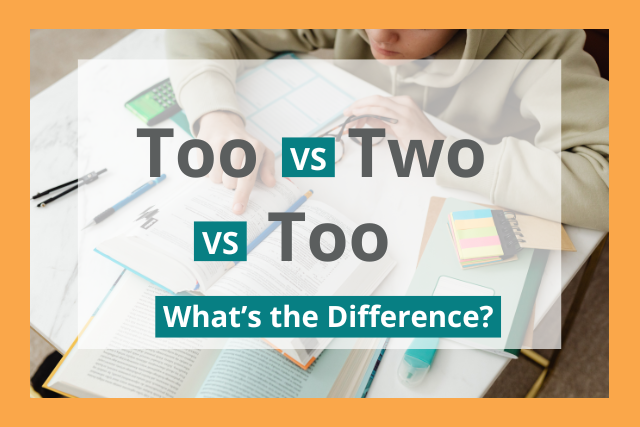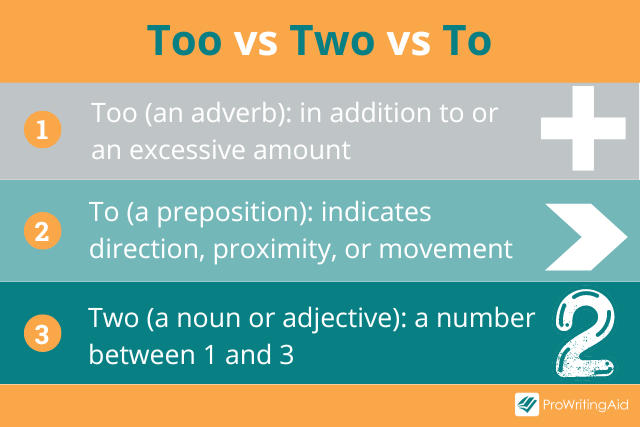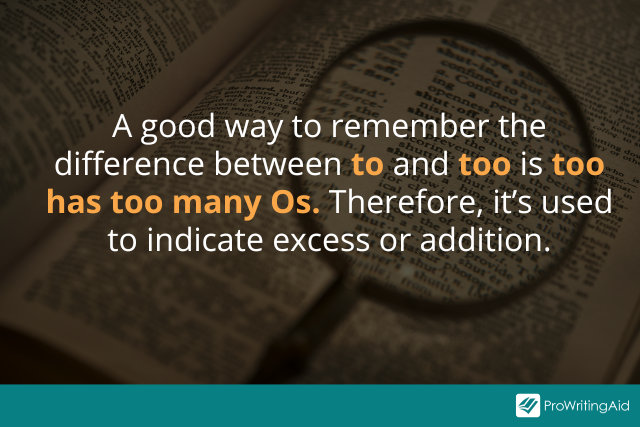/ / Uncategorized
What’s the Difference Between To, Too, and Two?
Contents
- 1 What’s the Difference Between To, Too, and Two?
- 2 Using To in a Sentence
- 3 Using Too in a Sentence
- 4 Using Two in a Sentence
- 5 Remembering To vs. Too vs. Two
- 6 Outside Examples
- 7 Quiz: Too vs. To vs. Two
- 8 Article Summary
To, too, and two are all homophones, which means that they sound exactly the same but have different spellings and definitions.
The primary use of to is as a preposition that shows motion towards a point. In other words, it is the opposite of from. There are multiple other definitions that will appear in more detail below.
- The turtle and the rabbit raced to the finish line.
Too is an adverb that means also or overly.
- If my sister gets ice cream I should get ice cream too. It’s only fair.
Two is a noun or adjective that is the number between one and three.
- The soccer player scored two goals in the last minutes of the game.
Now, let’s go over a few ways to use these words in English.
Using To in a Sentence
When to use to: To is usually a preposition, but it can also be an adverb. It has many definitions. These include towards, until, and with intention.
To is also part of the verb in its infinitive form. There are many more uses that are similar to those already mentioned, or that are less common.
For example,
- The lioness moved to her prey. (first definition)
- The workers must work from noon to six o’clock. (second definition)
- He bought a gun to rob the store. (third definition)
- The dog likes to run. (fourth definition)
There are many idioms that use to:
- to a certain extent: somewhat
- It’s true to a certain extent that the President embezzled, but he used the money to help the poor people of the country, which was part of his job.
- to and fro: from one place to another, often with a backwards and forwards movement
- The man had drunk too much wine and he staggered to and fro along the sidewalk. .
- from time to time: occasionally
- I don’t go dancing often, but I do dance from time to time.
There are many more in which to plays only a minor role in the overall meaning of the expression that aren’t included above.
Using Too in a Sentence
When to use too: Too is an adverb that describes something that is excessive. It can also mean also.
For example,
- I feel sick because I ate too much popcorn. (first definition)
- Don’t run too much on your bad knee or you’ll injure yourself. (first definition)
- I want some cake too! (second definition)
There are also many idioms and expressions that use too:
- not a moment too soon: right before it would be too late
- Thank goodness the police got here before the man shot anyone! They arrived not a moment too soon.
- too many cooks in the kitchen: so many people working on a single project that they are unable to function well
- Why do you have ten people working on this simple poster? You should have been done hours ago. This is a case of too many cooks in the kitchen. You two finish the poster and the rest of you go work on something else.
- too long; didn’t read: The text was too long so one didn’t read it
- “Too long; didn’t read” is often abbreviated as tl;dr and introduces a short summary of the text for those who don’t want to read the whole thing.
- not too shabby: not bad
- Is that a new dress? Not too shabby!
- to spread oneself too thin: to do more work than one can handle
- You can’t work extra hours. You’re already working 60 hour weeks. You’ll spread yourself too thin.
Too has a negative connotation, so don’t use it when you want to express something positive. For example, I had so much fun at the party means you had a good time. I had too much fun at the party could imply you drank so much that you got sick, or did something else you regret.
Using Two in a Sentence
When to use two: Two can be an adjective or a noun. It refers to the number after one and before three.
For example,
- I have two cats. (adjective)
- One plus one equals two. (noun)
There are also many idioms and expressions that use two, some of which are below:
- to be eating for two: a pregnant woman is eating for herself and her fetus
- Here, have some more food. You’re eating for two!
- to go number two: to defecate
- Mommy, I have to go number two.
- two faced: duplicitous
- She seems nice at first, but don’t trust her. She’s very two-faced.
- two peas in a pod: two people who are very similar
- The best friends are like two peas in a pod. They do everything together, like the same things, and even look alike!
- the lesser of two evils: the better of two bad choices
- I don’t like either of the candidates running for president, but I’ll vote for the incumbent because she’s the lesser of two evils.
In its written form, two can be spelled out or written as the symbol 2.
Remembering To vs. Too vs. Two
There are a few different ways to remember the distinctions between these three words.
Let’s start with how to remember the word to. Many prepositions, especially the most common, have only two letters. This includes in, on, at, of, and by.
Prepositions usually show how two elements of a sentence relate to one another, especially through time or location. If this is too hard to remember, you can also remember that to and towards share the same first two letters, and have the same meaning in many contexts.
To remember the word too, think of its two closest synonyms: also and overly. When placed side by side, also overly, you can see the double oo like in the word too.
Finally, it can help to think of the word twenty to remember that there is a w in both the numbers twenty and two. Alternatively, you could remember that two is spelled with w, which is pronounced as double u, and double means 2.
Outside Examples
- Once the sun begins to reappear, the AAO says to immediately return the glasses to watch the remaining phase of the eclipse. –Chicago Tribune
- Things were great until a few months later, when snow began to fall and no one wanted to stop for music. So she took her act to a Times Square subway platform. –New York Post
- “We definitely have to win,” Jones said. “It’s just too big of a deficit with three races to go. I think the pressure is on, but we’ve been handling the pressure really well.” –USA Today
- “God’s Problem Child” is too finely made — and often too funny — to suggest that Nelson has finally run out of steam. –LA Times
- Joshua Wong, the face of huge street demonstrations in 2014 for freer elections of Hong Kong’s leader, was sentenced to six months in prison. Two fellow protest leaders, Nathan Law and Alex Chow, were given eight and seven months, respectively. –New York Times
- Tucker and his wife Heidi had been been married for one year, but had not yet been on their honeymoon. So the California couple set out on a two-week trip to Europe to celebrate their marriage.–LA Times
Quiz: Too vs. To vs. Two
Instructions: Fill in the blank with the correct word, too or to or two, in the correct form.
- I need _______ guitars because I need an electric one and an acoustic one.
- I’m going _____ travel to China next year!
- I have _______ many books. I’ll never be able to pack all of them for the move.
See answers below.
Article Summary
Should I use to, too, or two? These words have similar spellings and the same pronunciation. However, there is no overlap between their definitions.
- To has many meanings but usually is a preposition meaning towards or until, or part of an infinitive verb.
- Too can mean either also or describe an excessive amount of something.
- Two refers to the number after one.
Make sure you know which of the three words has which meaning.
Answers
- two
- to
- too
Three commonly confused words in the English language are to, too, and two. These three words are homophones, meaning that they’re pronounced the same way, but they’re all spelled differently, and they have very different meanings.
So when should you use each word?
The short answer is that to is a preposition that indicates direction, too means also or indicates excess, and two is a number.
Read on to learn the distinct meanings of to, too, and two and to see examples of how to use these words in sentences.
Quick Definition and Meaning of “To”
To is a preposition with several meanings. Some of these meanings refer to proximity, distance, movement, location, and purpose.
Most often, to is used to indicate a direction toward something. If you say, “I drove to the office,” that means you drove in the direction of the office.
To can also be used with a verb to create its infinitive form. For example, you might say “I love to dance.”
To also expresses a range. For example, you might say, “I’ll be ready in five to ten minutes.”
Here are some other examples of when to use to:
- I don’t want to leave the party.
- I like visiting my friends in America from time to time.
- You have to pass the exam in order to graduate.
Quick Definition and Meaning of “Too”
The word too is an adverb with two meanings.
The first meaning is also or in addition to. For example, you might say “If you’re going to the concert tonight, I want to come too.”
Too can also be used to indicate an excessive degree. It can mean something similar to very or an excessive amount. If you say, “The dish was too spicy for me,” that means you think the dish was excessively spicy.
Here are some other sample sentences of when to use too:
- I have class tomorrow, too.
- The young puppy had too much energy.
- It was too late to take back his mistake.
Quick Definition and Meaning of “Two”
Out of the three words to, too, and two, two is probably easiest to understand. Two only has one meaning: it’s the integer between one and three.
For example, you might say, “I have to leave in about two hours.”
Here are some other examples of when to use two:
- I have two sisters.
- I only know two words in Spanish.
- Spiders have eight eyes, while most animals only have two.
What’s the Difference Between To vs Too vs Two?
To, too, and two all serve different roles in a sentence. As a general rule, you can remember their parts of speech to remember their separate meanings:
- To is a preposition
- Too is an adverb
- Two is a noun or an adjective
Whenever you’re expressing a number, you should use two instead of to or too. One tip is to remember that two starts with TW like the word twins also starts with TW, and twins refers to two children born at the same birth.
A good way to remember the difference between to and too is too has too many Os. Therefore, it’s used to indicate excess or addition.
Examples of To, Too, and Two Used in Sentences
The best way to learn how to spell words correctly is to look at examples of how they’re used in the real world. Here are some examples of how to use to vs too vs two in a correct sentence.
Let’s start with some examples of to:
“Henry was invited to book launches and literary festivals around the world.”—Yann Martel, Beatrice and Virgil
“He pounded on the earth, trying to keep the hands from pulling him under.”—Roy Johansen, Beyond Belief
“I wanted to write, and just tell you that me and my spirit were fighting this morning.”—Peter Straub, In the Night Room
Now let’s look at some examples of too:
“By the time he decided to act, he’d been too late.”—Nora Roberts, The Heart of Devin MacKade
“The kitchen, too, disappeared under a pile of rubble.”—C.T. Adams and Cathy Clamp, Touch of Darkness
“The body holding the guitar in its hands has a name, too.”—Maurice G. Dantec, Grand Junction
Finally, here are some examples of two:
“Two roads diverged in a wood, and I—I took the one less traveled by, and that has made all the difference.”—Robert Frost, “The Road Not Taken”
“As you grow older, you will discover that you have two hands: one for helping yourself, the other for helping others.”—Sam Levenson, In One Era & Out the Other
“For the two of us, home isn’t a place. It is a person. And we are finally home.”—Stephanie Perkins, Anna and the French Kiss
Conclusion on To vs Too vs Two
Now you know the full difference between to vs too vs two.
If you’re not sure which spelling to use, you can always run your writing through ProWritingAid, which will highlight incorrect words and guide you toward the correct option. It’s great for picking up tricky homophones like these.
Take your writing to the next level:
20 Editing Tips from Professional Writers
Whether you are writing a novel, essay, article, or email, good writing is an essential part of communicating your ideas.
This guide contains the 20 most important writing tips and techniques from a wide range of professional writers.

Download Article
Download Article
Though it is a common mistake, the words «to» and «too» are very easy to differentiate. Once you know how to tell, you can teach others how to get it right too!
Usage Chart
-
1
Focus on «too» first. «Too» is used less frequently than «to,» so if you know what «too» means, then you can use it just for those specific meanings. You can feel confident that when «too» is not appropriate, «to» is the right choice.[1]
- Try stressing (emphasizing) «too» when spoken, to help yourself assess whether it is the correct word. If the word is meant to be «to,» it will sound odd if stressed. «Too» can be emphasized without sounding unusual.
-
2
Learn the meanings for «too». The first meaning is «also» or «besides»; the second meaning is «excessively» or «extra». In addition, some people use it to mean «very».[2]
Think of too as being relevant when there is an increase in something, such as temperature, difficulty, etc.; for example, «too hot», «too challenging», or «too soft». [3]
- Choose the word «too» when it can be substituted for the word «also.»
- For example: «She felt awful too (also)» or «I can see you too (also)».
- Use «too» to modify or emphasize a word.
- For example: «The weather is too (excessively) hot», «I’ve eaten too (excessively) much», or «The package is too (excessively/extra) big».
- «He wasn’t too (very) interested in my book.»
Advertisement
- Choose the word «too» when it can be substituted for the word «also.»
-
3
Learn the role of «to.» «To» is a preposition. Use «to» for expressing direction, place, or position.[4]
- «To» can be used when going towards something.»I am going to the store» or «Will you just go to bed please!»
- «To» can be used when you’re doing something in the direction of something or someone, such as: «I am speaking to your friend», or «I am looking to the right».
-
4
Understand that «to» is also used when you’re using a verb in the infinitive.
- For example: «To go home», «to catch a mouse», or «to open the door.»
-
5
Practice telling «to» and «too» apart. Here are a few examples to test yourself with (answers in «Tips» below):
- She’s coming [to/too] your party [to/too].
- I’m [to/too] hot [to/too] help you carry [to/too/two] suitcases [to/too] the bus station.
- We are hoping [to/too] be near the festival [to/too].
- It’s [to/too] early [to/too] be asking me questions about where I am headed [to/too].
- I hate [to/too] disturb your thoughts but are you ready [to/too] help us with our homework [to/too]?
Advertisement
Add New Question
-
Question
Should I say like to or like too?
What is the context of your phrase? If you want to say ‘I like to swim’ you should use ‘to’. ‘Like too’ can be used too, but in a different meaning. For example: ‘I like too much wine’ (In this case ,you don’t like an action but you like too much of something).
-
Question
Is saying «to cute» incorrect?
It depends on context. If someone went from ugly to cute, for example, then «to» is correct. However, if something is overly cute, it’s «too» cute.
-
Question
Why can’t I use (to) in front of (home)?
The word «to» implies direction, the word «too» implies «also». For example, Take me to your home. I am going home, too. Without any other context to your question, this is the best response that can be made.
See more answers
Ask a Question
200 characters left
Include your email address to get a message when this question is answered.
Submit
Advertisement
-
Some claim that never-ending a sentence with a preposition is grammatically correct and that following this «logic» can prevent you from making a mistake with «to» and «too» because it’d mean you’d always avoid using the word «to» at the end of any sentence. However, this is based on a misunderstanding and modern grammarians claim that it is perfectly acceptable to place prepositions at the end of a sentence, and always has been.[5]
-
Although a less (but still) common mistake, don’t forget about «two.» This is easy to distinguish because it means the number, 2.[6]
-
Keep in mind some more examples:
- Do you think we’re arriving too soon?
- Here, you can stress «toooo», as in it’s much sooner than we should be arriving.
- It’s a cold day to be playing outside.
- Stressing here doesn’t add any emphasis or give more information.
- They are going to the beach with us.
- Stressing here doesn’t add emphasis or information because «to» is simply being used as a preposition.
- Do you think we’re arriving too soon?
Show More Tips
Thanks for submitting a tip for review!
Advertisement
About This Article
Article SummaryX
To use «too» and «to» correctly, use «too» when you want to say «also» or «excessively,» and use «to» as a preposition for expressing direction, place, or position. For example, you would use «too» in «I like cake too» or «I eat too much cake.» However, you would use «to» in «Let’s go to the cake shop» or «I want to get some cake.» An easy way to remember is that «too» is often stressed when it’s spoken and «to» is never stressed. To learn how to practice using «too» and «to» correctly, scroll down!
Did this summary help you?
Thanks to all authors for creating a page that has been read 3,132,858 times.











